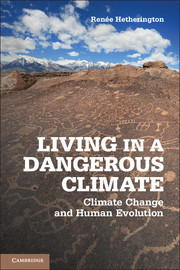Book contents
- Frontmatter
- Contents
- Figures
- Tables
- Foreword: Evolution and the Human Condition
- Acknowledgments
- Preface
- Earth’s Climate
- The Evolution of the Homo Species
- Climate and Human Migration
- Climate and Agriculture
- The Dominant Paradigm
- Today and Tomorrow
- The Economic Connection
- 18 The Economic Connection
- 19 The Progress of Dominance
- Dangerous Attitudes
- Living in Dangerous Times
- Glossary
- Notes
- Index
18 - The Economic Connection
Published online by Cambridge University Press: 05 June 2012
- Frontmatter
- Contents
- Figures
- Tables
- Foreword: Evolution and the Human Condition
- Acknowledgments
- Preface
- Earth’s Climate
- The Evolution of the Homo Species
- Climate and Human Migration
- Climate and Agriculture
- The Dominant Paradigm
- Today and Tomorrow
- The Economic Connection
- 18 The Economic Connection
- 19 The Progress of Dominance
- Dangerous Attitudes
- Living in Dangerous Times
- Glossary
- Notes
- Index
Summary
If something is good for the corporation, it’s per se held to be good for the country.
John Kenneth Galbraith, quoted in a 2003 interview with Stephen Bernhut that appeared in the Ivey Business Journal
A culture defined by imbalance and fragmentation perpetuates itself – keeps us buying – by directing our attention outward. The single greatest threat to the corporate-consumer complex is that on our way to the mall, we might get distracted.
Carol Lee Flinders, Rebalancing the WorldCapitalism and democracy – an introduction
Democracy in its original sense of “rule by the people or government in accordance with the will of the bulk of the people” was not a popular notion until the advent of the First World War. Prior to this, democracy was rejected by the ruling elite as a bad thing that gave too much power to the common people, making it “fatal to individual freedom and to all the graces of civilized living.”
Canadian economist C. B. Macpherson, in his book The Real World of Democracy, illustrates how our present-day liberal democracies began as liberal societies that later adopted democracy. The predemocratic liberal society of the Western world operated with competition and freedom of the market. Both government and society as a whole were organized on the basis of freedom of choice, freedom of religion, freedom of employment. People were free to offer their services and labor on the open market, free to spend their earnings and to invest based on current prices – and in doing so they determined what would be produced and at what price. In this way the resources of the society, its “capital,” were allocated as efficiently and effectively as possible. This was the basis of Adam Smith’s “invisible hand,” which kept the market free from interference and allowed for the most efficient distribution of resources throughout the economy.
- Type
- Chapter
- Information
- Living in a Dangerous ClimateClimate Change and Human Evolution, pp. 155 - 167Publisher: Cambridge University PressPrint publication year: 2012



